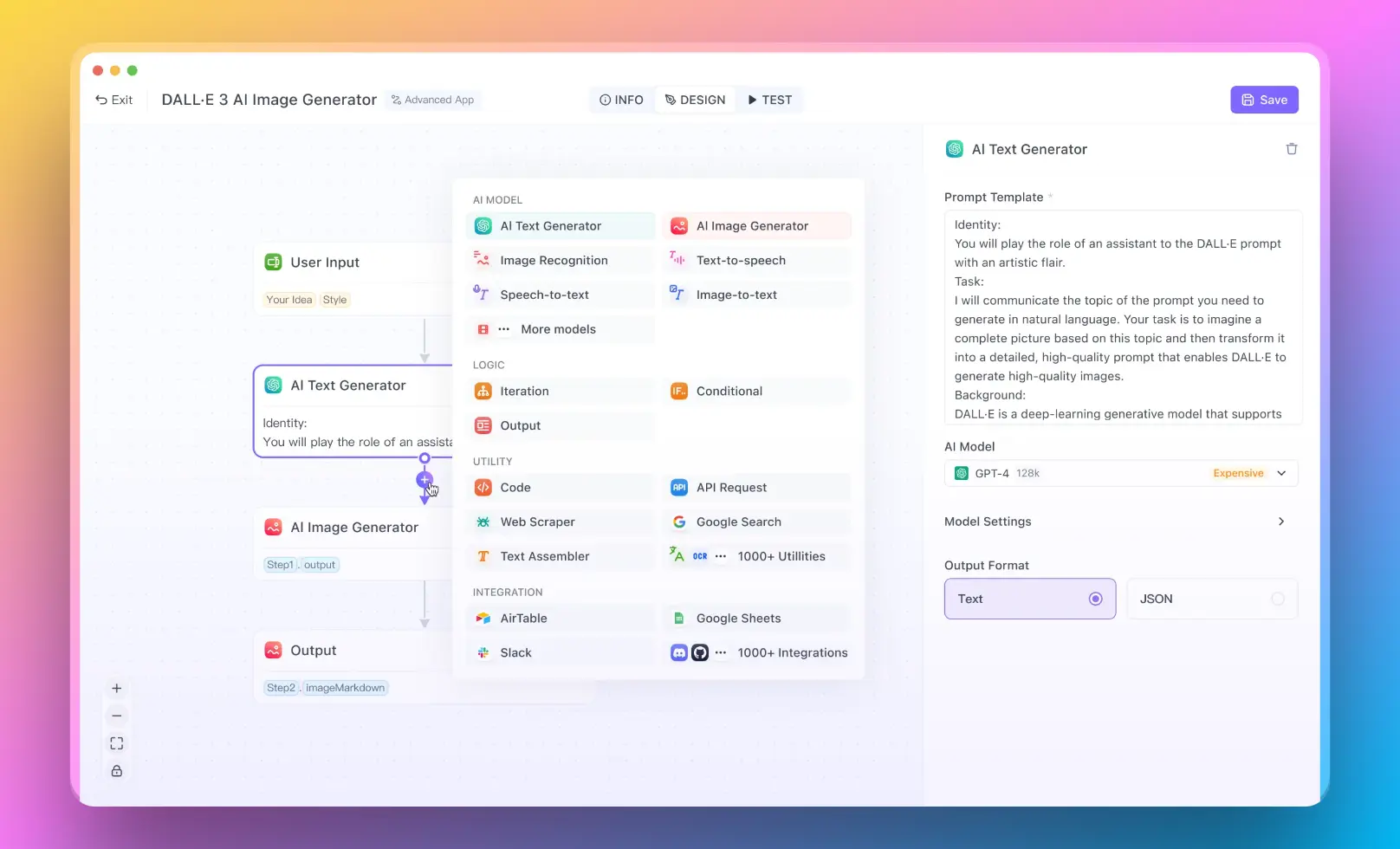In today's fast-paced business environment, workflow automation has become a critical component for streamlining processes, improving efficiency, and driving productivity. Open source workflow engines have emerged as powerful tools that enable organizations to design, execute, and monitor complex workflows without the need for proprietary software or expensive licensing fees. In this article, we'll explore the top 10 open source workflow engines, including the innovative Anakin AI platform, that can revolutionize your workflow automation efforts.
1. Anakin AI: The Ultimate AI-Powered Workflow Automation Platform
Anakin AI is a game-changer in the world of workflow automation, offering a comprehensive no-code platform for building custom AI applications, workflows, and intelligent agents. With its user-friendly interface and advanced AI capabilities, Anakin AI empowers users to automate complex tasks without the need for coding expertise.
Key Features:
- No-code AI app builder
- Diverse AI app types (text generators, image generators, video generators, workflows, batch processing jobs, and auto agents)
- Integration with popular tools and services
- Advanced AI models (GPT-3.5, GPT-4, Claude 2, Stable Diffusion, DALL·E, Gemini, PaLM, Mistral, Meta Llama, and Bard)
- Batch operations and auto agents for automation

Pricing:
- Free Plan: 30 free personal credits/day, basic functions, limited batch running
- Basic Plan: $9.90/month, 5,000 personal credits/month, unlimited batch running, dedicated client server
- Pro Plan: $19.90/month, 10,000 personal credits/month, unlimited batch running, dedicated client server
2. Apache Airflow: Popular Open Source Workflow Engine

Apache Airflow is a popular open source workflow management platform designed to programmatically author, schedule, and monitor workflows. It is widely used in data engineering pipelines, machine learning workflows, and batch processing systems.
Key Features:
- Programmatic authoring of workflows in Python
- Powerful scheduling and monitoring capabilities
- Scalable and fault-tolerant architecture
- Integration with various data sources and tools
3. Camunda: Popular Open Source Workflow Engine for Decision Automation

Camunda is an open source workflow and decision automation platform that supports BPMN (Business Process Model and Notation) for process modeling and execution. It is widely used in enterprise applications and microservices architectures.
Key Features:
- BPMN 2.0 compliant process engine
- Powerful decision engine for business rules management
- Extensive monitoring and reporting capabilities
- Seamless integration with Java and other programming languages
4. Flor: Popular Open Source Workflow Engine in Ruby

Flor is a lightweight and flexible open source workflow engine written in Ruby. It is designed to be easily embeddable in Ruby applications and provides a simple and expressive syntax for defining workflows.
Key Features:
- Simple and expressive syntax for defining workflows
- Embeddable in Ruby applications
- Lightweight and efficient
- Support for distributed execution and monitoring
5. Temporal: Popular Open Source Workflow Engine for Scalable Applications

Temporal is an open source workflow engine designed for building reliable and scalable applications. It provides a programming model for writing fault-tolerant and stateful workflows, making it suitable for mission-critical applications.
Key Features:
- Fault-tolerant and stateful workflow execution
- Scalable and distributed architecture
- Support for long-running workflows
- Integration with various programming languages
6. Argo Workflows: Popular Open Source Workflow Engine for Kubernetes

Argo Workflows is an open source container-native workflow engine for orchestrating parallel jobs on Kubernetes. It is designed to be scalable, reliable, and easy to use for complex workflows.
Key Features:
- Container-native workflow execution
- Scalable and fault-tolerant architecture
- Support for complex workflows with parallelism and dependencies
- Integration with Kubernetes and other cloud-native technologies
7. Cadence: Popular Open Source Workflow Engine for Microservices

Cadence is an open source workflow engine designed for building distributed applications and microservices. It provides a programming model for writing fault-tolerant and scalable workflows, making it suitable for mission-critical applications.
Key Features:
- Fault-tolerant and scalable workflow execution
- Support for long-running workflows
- Integration with various programming languages
- Distributed architecture for high availability
8. Zeebe: Popular Open Source Workflow Engine for Event-Driven Workflows

Zeebe is an open source workflow engine designed for orchestrating and monitoring complex, event-driven workflows. It is designed to be horizontally scalable and fault-tolerant, making it suitable for mission-critical applications.
Key Features:
- Event-driven workflow execution
- Horizontally scalable and fault-tolerant architecture
- Support for complex workflows with parallelism and dependencies
- Integration with various programming languages
9. Conductor: Open Source Workflow Engine for for Distributed Applications

Conductor is an open source workflow engine designed for orchestrating microservices and distributed applications. It provides a programming model for writing fault-tolerant and scalable workflows, making it suitable for mission-critical applications.
Key Features:
- Fault-tolerant and scalable workflow execution
- Support for long-running workflows
- Integration with various programming languages
- Distributed architecture for high availability
10. Activiti: Open Source Workflow Engine for process modeling and execution

Activiti is an open source workflow engine that supports BPMN 2.0 for process modeling and execution. It is widely used in enterprise applications and provides a user-friendly web-based designer for creating and managing workflows.
Key Features:
- BPMN 2.0 compliant process engine
- Web-based designer for creating and managing workflows
- Extensive monitoring and reporting capabilities
- Integration with various programming languages
How to Choose a Open Source Workflow Engine
These top 10 open source workflow engines offer a diverse range of features, capabilities, and use cases, catering to various workflow automation needs. Whether you're looking for a no-code solution like Anakin AI, a data engineering pipeline tool like Apache Airflow, or an enterprise-grade workflow engine like Camunda, there's an open source option that can meet your requirements.
By leveraging the power of open source workflow engines, organizations can streamline their processes, improve efficiency, and drive productivity without the need for expensive proprietary software. Additionally, the open source nature of these tools fosters a vibrant community of developers and contributors, ensuring continuous improvement and innovation.
When choosing an open source workflow engine, it's essential to consider factors such as scalability, fault tolerance, integration capabilities, and community support. Additionally, evaluating the specific requirements of your organization, such as the complexity of workflows, programming language preferences, and deployment environments, will help you make an informed decision.
Embrace the power of automation and unlock new levels of efficiency with these top 10 open source workflow engines. Whether you're a small business or a large enterprise, these tools can help you streamline your processes, reduce manual effort, and drive growth and success in today's competitive landscape.
FAQ: Open Source Workflow Engines
What is an open source workflow?
An open source workflow is a set of tasks or processes that are automated and managed using open source software or tools. Open source workflows are typically designed to be flexible, customizable, and transparent, allowing users to modify and extend the workflow logic according to their specific needs.
What is a workflow engine product?
A workflow engine product is a software application or platform that enables the design, execution, and monitoring of workflows. It provides a framework for defining and orchestrating the sequence of tasks, managing data flow, and handling exceptions or errors within a workflow. Workflow engine products often include features such as visual workflow designers, task scheduling, and monitoring capabilities.
What are workflow engine tasks?
Workflow engine tasks are the individual steps or activities that make up a workflow. These tasks can be automated or manual, and they are executed in a specific order or based on certain conditions or events. Workflow engine tasks can include various operations, such as data processing, decision-making, human interactions, or integrations with external systems or services.
What is an alternative to Zeebe?
Zeebe is an open source workflow engine designed for orchestrating and monitoring complex, event-driven workflows. Some alternatives to Zeebe include:
- Apache Airflow: A popular open source workflow management platform designed for programmatically authoring, scheduling, and monitoring workflows.
- Camunda: An open source workflow and decision automation platform that supports BPMN (Business Process Model and Notation) for process modeling and execution.
- Temporal: An open source workflow engine designed for building reliable and scalable applications with fault-tolerant and stateful workflow execution.
- Conductor: An open source workflow engine designed for orchestrating microservices and distributed applications with fault-tolerant and scalable workflow execution.
These alternatives offer similar capabilities to Zeebe, such as event-driven workflow execution, scalability, fault tolerance, and support for complex workflows with parallelism and dependencies.
